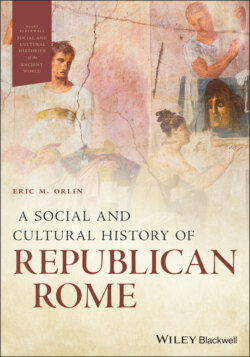Читать книгу A Social and Cultural History of Republican Rome - Группа авторов - Страница 28
Key Debates: How Did the Romans Come to Rule the Mediterranean?
ОглавлениеIn 390 BCE, the Roman state suffered a massive defeat to a marauding band of Gauls, leaving the city in a shambles and perhaps at its lowest point in terms of power. The Romans destroyed the cities of Carthage and Corinth 250 years later, wiping out the only challenge to her power in the western Mediterranean, and cementing her control of the eastern Mediterranean. The rise from nowhere to the sole superpower of the ancient Mediterranean is as remarkable as it was surprising. How did it happen?
One theory has become known to modern historians as “defensive imperialism.” In an effort to avoid a repeat of the Gallic sack, the Romans went to great lengths to protect themselves. As a result, they pushed back on any bordering state that they felt presented a possible threat. By claiming a defensive posture, they could also assure themselves that each war was a just war fought against an aggressor, and therefore they might earn the sanction of the gods for their war effort.
In the 1970s, William Harris began to push back against the theory of defensive imperialism promoted by the Romans and accepted by many modern historians. He argued that the military ethos that ran through Roman society continually led the Romans into new wars. Valor in war was a key sign of being a true Roman man, and military success was seen as the be-all and end-all of a successful politician. The way to electoral success was through success in war, not social programs or just application of the law. Thus almost every member of the elite wanted to see Rome in a state of war that would give them a chance of political advancement.
A third theory, perhaps driven by thinking about modern wars, suggests that Rome’s conquests were driven by economic concerns. There is limited evidence that the Romans fought in order to acquire trade routes and natural resources to exploit. Rather, the Romans may have been driven by individual desires. Since Roman generals both kept a share of captured treasure for themselves and distributed some to their soldiers, individuals stood to benefit economically from conquest. This notion of economic motivation makes sense of the First Punic War where Polybius claims the Romans only went to war when their generals “pointed out the great benefit in terms of plunder that each and everyone would receive from it.” In other words, personal greed may have led the Romans into war.
All of these answers are likely to have some element of truth to them. Indeed, each conquest brought with it new territory and thus a world that became increasingly complex, and Roman motives must surely have shifted over time.
The Roman conquest of Magna Graecia also brought them into contact with the island of Sicily, just off the toe of Italy. The western part of the island had also been settled by Greeks in the eighth century BCE, but the remainder was controlled by the city-state of Carthage (located in modern day Tunisia). Over the next century, Rome fought a series of three wars against Carthage, known as the Punic Wars, which made Rome the sole power in the western Mediterranean. The First Punic War (264–241 BCE) centered on control of Sicily and required Rome to develop a navy for the first time. The Second Punic War (218–202 BCE) represented undoubtedly the greatest threat to Rome’s survival. The Carthaginian general Hannibal crossed the Alps with an army of 30,000 infantry, 10,000 cavalry, and 38 elephants, and won three consecutive battles in Italy, killing over 100,000 men in the process. This casualty rate represents about one-third of the Roman adult male population at the time. While some of the soldiers killed came from allied towns in Italy, the losses were so severe that Hannibal was able to march his troops to the very gates of Rome without opposition. However, Hannibal was not equipped for siege warfare, and the Romans managed to rally enough allies to resist. They then employed guerrilla warfare to avoid another massive defeat in battle, and by weakening Hannibal’s supply lines, the Romans were able to force him to return to Africa. In 202 BCE, Scipio Africanus (236–183 BCE) led Roman troops to a victory at the battle of Zama (202 BCE) and brought the war to a successful conclusion for the Romans. The war gave Rome control of coastal Spain and so catapulted the Romans to the world stage as a major power. But the Romans maintained a constant, possibly irrational fear, of a Carthaginian revival. Forty years later, the Roman statesman Cato the Elder (234–149 BCE) took to ending every speech in the Senate with the words “Carthago delenda est!” (Carthage must be destroyed!). Eventually the Romans listened and launched the Third Punic War (149–146 BCE). After a short siege they captured Carthage, destroyed the city completely and, according to legend, sowed salt in the ground as a sign that the land would never again be inhabited.
